Trump’s dream of zero Iranian oil exports will never happen, oil minister says
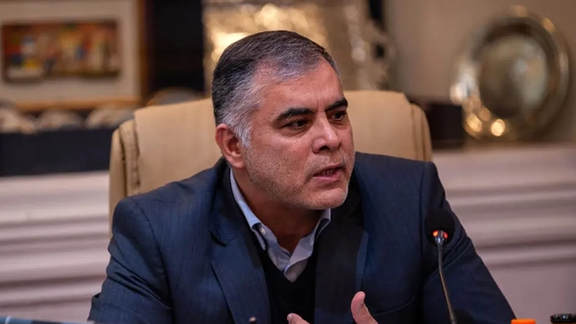
Iran's oil minister said US President Donald Trump's maximum pressure policy on Tehran has failed, along with his goal of cutting Iran's oil exports to zero.

Iran's oil minister said US President Donald Trump's maximum pressure policy on Tehran has failed, along with his goal of cutting Iran's oil exports to zero.
"The more they restrict us, the more complex our response will be," Mohsen Paknejad was quoted as saying on Sunday by state media. "The dream of cutting Iran's oil exports to zero is one they will never achieve."
His remarks came after Trump's directive on Tuesday restoring the so-called maximum pressure policy on Iran of his first term aimed at driving the Islamic Republic's oil exports to zero.
Experts say Trump's goal of eliminating Iran’s oil exports is particularly alarming for Tehran as it would eliminate nearly half of the government's revenues during a seven-year economic crisis.
Iran's President Masoud Pezeshkian downplayed the move on Wednesday, saying "They believe our economy depends entirely on oil and aim to block our exports, but there are many ways to counter their efforts."
However, oil is critical for Iran's economy, accounting for around 15% of Iran's GDP and employing around a third of the country's 25 million workers.
Under the Biden administration, Iran's oil revenues in fact surged, in spite of global sanctions.
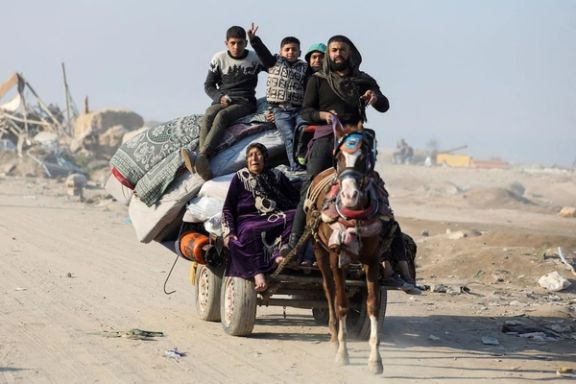
The Organization of Islamic Cooperation (OIC) must convene an emergency meeting to condemn Donald Trump's plan to seek US ownership of the Gaza Strip and move out its population, Iran's top diplomat told his Muslim counterparts on Saturday.
During a joint news conference in Washington on Tuesday with Israeli Prime Minister Benjamin Netanyahu, Trump said that he envisioned the US assuming control over the Gaza Strip, relocating its residents elsewhere, and transforming the war-ravaged coastal area into what he called the “Riviera of the Middle East.”
In separate phone calls with his Egyptian, Turkish and Pakistani counterparts, Iran's foreign minister Abbas Araghchi called for an emergency meeting of the OIC to "adopt a unified and firm stance in countering this plot against the fate of the Palestinian people."
"The forced displacement of Palestinians from Gaza is a colonialist conspiracy to erase Palestine and a serious threat to regional stability and security," Araghchi told Egypt's Badr Abdelatty.
Araghchi said the OIC can "play a crucial role in countering the ethnic cleansing plan in occupied Palestine."
Trump's proposal has already sparked outrage in the Middle East, including in Egypt and Jordan, two close allies of Washington which Trump has suggested can take in the Palestinians.
A report by Israel's Channel 12 says Trump is also considering Morocco, Puntland, and Somaliland as other possible options for the relocation of Palestinians.
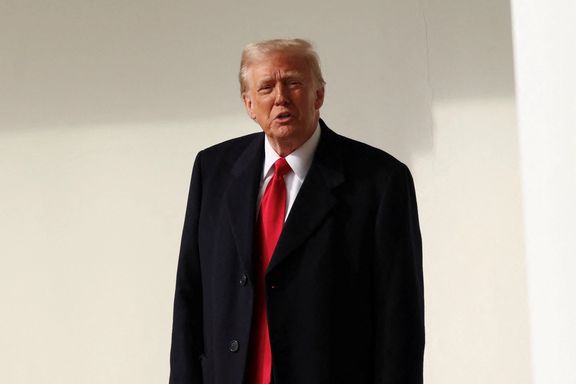
The Islamic Republic will not negotiate with the United States unless the Trump administration puts an end to his so-called maximum pressure policy against Iran, the country's foreign minister said Saturday.
"The removal of sanctions requires negotiation, but not under a policy of maximum pressure," Iran's Foreign Minister Abbas Araghchi said Saturday during a seminar in Tehran.
"We will never negotiate from a position of weakness," he added.
On Friday, a State Department spokesperson told Iran International that the Trump administration's maximum pressure policy on Iran will remain in place unless the Islamic Republic reaches a deal with Washington.
"President Trump has been clear that the United States is committed to preventing Iran from acquiring a nuclear weapon and expressed his willingness to discuss a deal with Iran," the spokesperson told Iran International.
"If the Iranian regime does not want a deal, the President is clear, Iran will remain under the restored maximum pressure campaign," the spokesperson added.
However, Araghchi says "there is truly no basis for fair negotiations" with the Trump administration.
"We negotiated before—for over two years, we negotiated in good faith, we reached an agreement in good faith, and we fulfilled our commitments in good faith. But what happened? They were the ones who failed to uphold their commitments and ultimately withdrew," Araghchi told reporters.
"So, what new development has occurred that makes them expect us to trust them again or enter negotiations once more? The only new development is that they are imposing even more pressure."
Iran's Supreme Leader Ali Khamenei on Friday morning firmly rejected the idea of negotiations with the United States, appearing to pour cold water on optimism by Trump and his own government for a nuclear deal.
“Negotiating with such a government should not be done; it is neither wise, intelligent nor honorable,” Iran's 85-year-old veteran theocrat who has the ultimate say over Iranian policy told a group of air force personnel in Tehran.
Khamenei accused Washington of perfidy over the last international nuclear deal in 2015, from which Trump withdrew the United States in 2018.
What new development has occurred that makes the Americans expect us to trust them again? From an expert perspective, there is no basis for a fair negotiation at all.
Trump on Tuesday reinstated the so-called maximum pressure policy on Iran from his first term but said he preferred a deal. Relative moderate President Masoud Pezeshkian has publicly expressed openness to US talks.
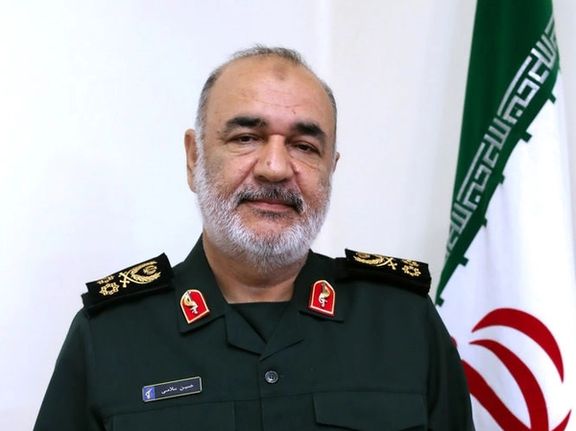
The Islamic Republic's 2024 attacks against Israel targeted the political heart of global arrogance and the eldest child of America, said the chief-commander of the Islamic Revolutionary Guard Corps (IRGC).
"Iran attacked the political heart of arrogance. Israel is America's eldest child; anyone would rather suffer harm themselves than see their child harmed," said Hossein Salami, referring to Iran's missile and drone strikes against Israel in April and October 2024.
"We acted in a way that prevented the enemy from responding and avoided war—this is astonishing and a miracle," he added.
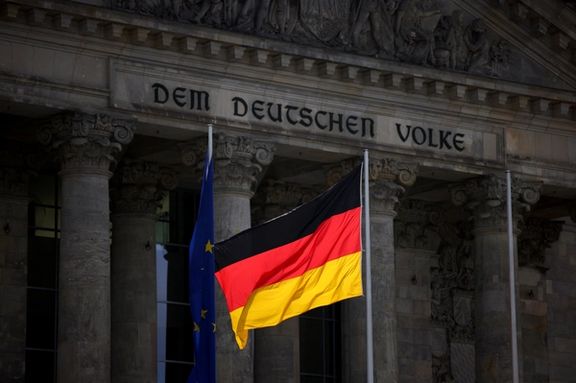
Diplomacy is the best way to stop Iran from getting nuclear weapons, a Federal Foreign Office spokesperson told Iran International Saturday, as the US ramps up its "maximum pressure" campaign.
In response to questions from Iran International about whether Germany, as a strategic partner of the United States, would cooperate with the White House and align with Washington’s pressure strategy, the spokesperson reaffirmed Berlin’s commitment to diplomatic engagement.
“In November 2024 and January 2025, together with our French and British partners, we conducted preliminary talks with Iran on the Iranian nuclear program, regional issues, and other issues of concern,” the spokesperson said.
Addressing recent US policy moves, the spokesperson added, “We have taken note of the National Security Presidential Memorandum that President Trump has issued. Over the last years, Germany has reduced its bilateral relations with Iran to a minimum. At the same time, we have been keeping channels of communication open. We are in contact with European partners, with the US, and with other partners regarding relations with Iran.”
While Germany and its European allies continue to prioritize diplomacy, tensions between Tehran and Washington are escalating. Speaking to a group of air force personnel in Tehran on Friday, Iran's Supreme Leader Ali Khamenei firmly rejected negotiations with the US. “Negotiating with such a government should not be done; it is neither wise, intelligent, nor honorable,” Khamenei said, undermining both President Donald Trump’s call for a new nuclear deal and Iranian President Masoud Pezeshkian’s stated openness to talks with Washington.
Nevertheless, the Iranian government signaled its willingness to continue dialogue with Europe. “The government's strategy is to ensure a unified voice from Iran. While everyone is aware of the existing challenges, today more than ever, we need greater unity and solidarity to overcome these difficulties,” Iranian government spokeswoman Fatemeh Mohajerani wrote on X Saturday. She added, “Negotiations with European countries will continue, and it is well understood that Iran will not engage in talks if they are conducted dishonorably.”
Nevertheless, the US remains steadfast in its approach. “President Trump has been clear that the United States is committed to preventing Iran from acquiring a nuclear weapon and expressed his willingness to discuss a deal with Iran,” a State Department spokesperson told Iran International. “If the Iranian regime does not want a deal, the President is clear, Iran will remain under the restored maximum pressure campaign.”
Germany confirms repatriation of dual national citizen's body
The German Federal Foreign Office also confirmed that its embassy in Tehran had worked “continuously over the past weeks to ensure the repatriation of Mr. Sharmahd's body to Germany.” A spokesperson told Iran International that the successful return was “the result of insistent diplomatic and consular efforts on several levels.”
Jamshid Sharmahd, a German-Iranian dissident, died in an Iranian prison while awaiting execution on charges of endangering national security. Iranian authorities claimed Sharmahd, who was abducted by Iranian agents in the UAE in 2020, died of a stroke before his scheduled execution. However, his family and human rights organizations have disputed these claims, citing the lack of transparent legal proceedings and credible evidence supporting his conviction.
Sharmahd’s daughter, Gazelle Sharmahd, confirmed to Iran International that German authorities informed her of the body’s return, though an autopsy is still required to confirm his identity. “Once that happens, we can say with certainty that it is my father,” she said, adding that the family plans to pursue legal action against Iranian authorities in Germany.
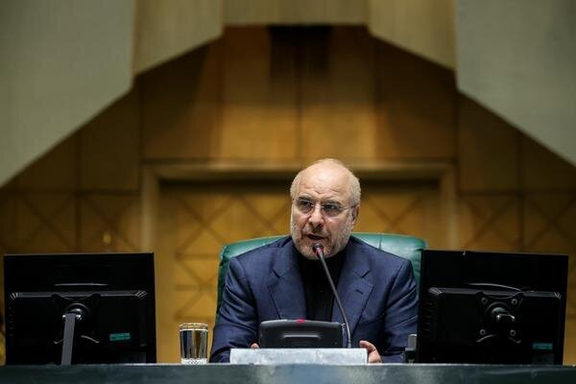
Supreme Leader Ali Khamenei's rejection of talks with the United States is final, Iran’s parliament speaker said, emphasizing that when Khamenei calls such negotiations “not honorable,” the decision is settled.
"Yesterday, the Supreme Leader made a clear and explicit statement on negotiations, which defines the consensus," he said. "My expectation and demand are that the president and his government colleagues align their actions with these directives and move forward accordingly."
Mohammad Bagher Ghalibaf also acknowledged internal divisions on the issue, warning against framing the debate as a simple "yes or no" to negotiations within the country's political landscape.
He also touched upon Khamenei's comments from the previous day, in which the Supreme Leader dismissed the idea of talks with Washington, calling them neither “wise, intelligent nor honorable.”
“Negotiations with the United States have no impact on solving the country's problems. We must understand this correctly and not be misled into thinking that sitting at the negotiation table with that government will resolve certain issues. No, negotiations with the United States will not solve any problems,” Khamenei said on Friday.
Khamenei’s remarks directly challenged those, including President Masoud Pezeshkian, who had expressed openness to potential discussions with the US on a new nuclear deal.
Trump called for Iran's full disarmament in written message
Ghalibaf said the Trump administration has sent a written message to Iran calling for the full disarmament of the Islamic Republic.
“The issue is not nuclear anymore. They speak of nuclear, missile, conventional and unconventional weapons; these are meant to disarm the Islamic Republic.”
Since 2018, when Trump imposed fresh oil export and banking sanctions, Iran's economy has worsened dramatically. The decline has been further exacerbated by decades of mismanagement, corruption, and a focus on funding foreign conflicts rather than addressing domestic needs.
The national currency has plummeted by 95%, losing 22 times its value, while inflation has remained stubbornly high at around 40% for the past five years. Official estimates now suggest that over a third of the population lives below the poverty line.